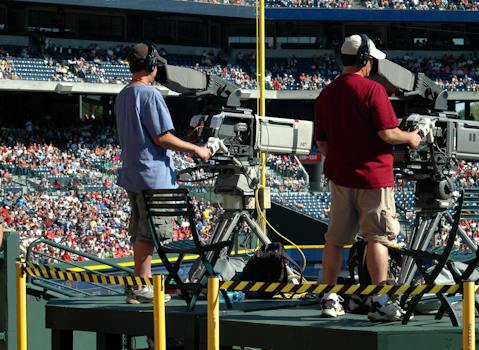

-
Table of Contents
VAR: Transforming Modern Football - Unveiling the Truth, One Decision at a Time.
Introduction
Video Assistant Referee (VAR) technology has been introduced in modern football to assist match officials in making more accurate decisions. While it has brought several benefits to the game, it also has its drawbacks. In this article, we will explore the pros and cons of VAR and its impact on modern football.
Advantages of VAR in Modern Football
Video Assistant Referee (VAR) technology has revolutionized modern football, bringing with it a host of advantages that have transformed the way the game is officiated. This innovative system, which uses video footage to assist referees in making crucial decisions, has been widely adopted across various leagues and tournaments worldwide. While VAR has its fair share of critics, there are several undeniable advantages that have made it an integral part of the beautiful game.
One of the primary advantages of VAR is its ability to rectify clear and obvious errors made by referees. In the past, referees were often burdened with the pressure of making split-second decisions that could have a significant impact on the outcome of a match. With VAR, however, referees now have the luxury of reviewing contentious incidents on a screen, allowing them to make more accurate and informed decisions. This has greatly reduced the number of glaring mistakes that could potentially mar the integrity of the game.
Furthermore, VAR has also played a crucial role in promoting fairness and justice on the football pitch. By providing referees with access to multiple camera angles and slow-motion replays, VAR ensures that decisions are made based on concrete evidence rather than mere conjecture. This has significantly reduced the instances of controversial goals being awarded or disallowed, ultimately leading to a more level playing field for all teams involved. The introduction of VAR has also curtailed the influence of external factors, such as biased officiating, thereby enhancing the overall integrity of the sport.
Another advantage of VAR is its ability to assist referees in identifying and punishing acts of simulation or diving. In the past, players often resorted to theatrical falls and exaggerated reactions in an attempt to deceive the referee and win a favorable decision. However, with VAR in place, such acts are now more likely to be exposed, as referees can review incidents in detail and identify instances of simulation. This has not only deterred players from engaging in unsportsmanlike behavior but has also helped in maintaining the spirit of fair play that is essential to the game.
Moreover, VAR has also had a positive impact on the spectator experience. With the introduction of VAR, fans are now able to witness the decision-making process in real-time, as referees review incidents on the pitchside monitor. This transparency has not only increased fan engagement but has also provided them with a deeper understanding of the game. Additionally, VAR has sparked lively debates and discussions among fans, further enhancing the overall excitement and interest surrounding football matches.
While the advantages of VAR are evident, it is important to acknowledge some of the drawbacks associated with its implementation. One of the main criticisms of VAR is the potential for delays in the game. The time taken for referees to review incidents and make decisions can sometimes disrupt the flow of the match, leading to frustration among players, coaches, and fans alike. However, with continued improvements in technology and the implementation of stricter time limits for VAR reviews, these delays can be minimized, ensuring a smoother and more efficient process.
In conclusion, the advantages of VAR in modern football are undeniable. From rectifying clear errors to promoting fairness and justice, VAR has transformed the way the game is officiated. Its ability to identify acts of simulation and enhance the spectator experience further solidifies its importance in the sport. While there are some drawbacks to consider, the overall impact of VAR on modern football has been overwhelmingly positive. As technology continues to evolve, VAR will undoubtedly play an even more significant role in shaping the future of the beautiful game.
Disadvantages of VAR in Modern Football

Disadvantages of VAR in Modern Football
While the introduction of Video Assistant Referee (VAR) technology in football has been hailed as a game-changer, it is not without its fair share of disadvantages. As with any new innovation, VAR has faced criticism and raised concerns among players, coaches, and fans alike. In this section, we will explore some of the drawbacks associated with VAR in modern football.
One of the main criticisms of VAR is the impact it has on the flow and pace of the game. Football is known for its fast-paced nature, with quick transitions and continuous action. However, VAR has introduced frequent interruptions, as referees pause the game to review decisions. This can disrupt the rhythm of the match and dampen the excitement for both players and spectators.
Furthermore, the time taken for VAR decisions can be a source of frustration. While the intention is to ensure accuracy, the lengthy delays in decision-making can lead to a loss of momentum and intensity. Fans are left waiting anxiously, and players may struggle to maintain their focus during these extended breaks. This can have a detrimental effect on the overall quality of the game and the entertainment value for those watching.
Another concern is the subjectivity involved in VAR decisions. Despite the use of technology, there is still room for interpretation and human error. VAR decisions are ultimately made by the on-field referee or a team of officials, and their judgment can be influenced by personal biases or differing interpretations of the rules. This can lead to inconsistent outcomes and a lack of clarity, undermining the very purpose of VAR in ensuring fairness and accuracy.
Moreover, VAR has not completely eradicated controversy from the game. While it aims to eliminate clear and obvious errors, there are still instances where VAR decisions are met with disagreement and controversy. The interpretation of handball incidents, offside calls, and fouls can still be a matter of debate, even with the assistance of technology. This can create a sense of frustration and disillusionment among fans, who may feel that VAR has not lived up to its promise of eliminating controversy.
Additionally, the reliance on VAR can lead to a loss of spontaneity and the human element in decision-making. Football has always been a sport where referees make split-second judgments based on their experience and understanding of the game. VAR, on the other hand, introduces a more clinical and analytical approach, which some argue takes away from the essence of the sport. The emotional reactions and debates that arise from controversial decisions are part of what makes football so captivating, and VAR can diminish these aspects.
In conclusion, while VAR has undoubtedly brought about significant changes in modern football, it is not without its drawbacks. The interruptions, delays, subjectivity, controversy, and loss of spontaneity associated with VAR have raised concerns among various stakeholders. As the technology continues to evolve, it is crucial to address these disadvantages and find ways to strike a balance between accuracy and the flow of the game. Only then can VAR truly transform modern football in a positive and effective manner.
Impact of VAR on the Game of Football
The introduction of Video Assistant Referee (VAR) technology has undoubtedly transformed the game of football. This technological innovation has been both praised and criticized for its impact on the sport. In this article, we will explore the pros and cons of VAR and its influence on modern football.
One of the major advantages of VAR is its ability to correct human errors. Refereeing decisions can often be subjective and prone to mistakes. VAR provides an additional layer of scrutiny, allowing referees to review incidents and make more accurate decisions. This has led to a decrease in controversial calls and increased fairness in the game.
Furthermore, VAR has also improved the overall integrity of football. With the ability to review incidents in real-time, VAR has helped in detecting and punishing acts of simulation, diving, and other forms of cheating. Players are now more cautious about their actions, knowing that they can be caught on camera and face disciplinary action. This has resulted in a cleaner and more honest game.
Another positive aspect of VAR is its impact on the outcome of matches. In the past, a single incorrect decision by a referee could change the course of a game. VAR has significantly reduced the chances of such game-changing errors. This has led to a more level playing field, where teams can rely on their skills and tactics rather than being at the mercy of a referee's judgment.
However, despite its advantages, VAR has also faced criticism. One of the main concerns is the disruption it causes to the flow of the game. VAR reviews can sometimes take several minutes, leading to a break in the game's momentum. This can be frustrating for players, coaches, and fans alike, as it interrupts the natural rhythm of the match.
Moreover, VAR has also been accused of taking away the human element from the game. Football has always been a sport where decisions were made by referees on the field, often in the heat of the moment. The introduction of VAR has shifted the power to a remote control room, where decisions are made based on video replays. This has led to debates about the essence of the game and whether it is losing its spontaneity and emotional appeal.
Another criticism of VAR is its inconsistency in decision-making. While the technology aims to provide objective decisions, there have been instances where different referees interpret the same incident differently. This has led to confusion and frustration among players, coaches, and fans, as they question the reliability and fairness of VAR.
In conclusion, VAR has had a significant impact on modern football. Its ability to correct human errors, improve integrity, and ensure fair outcomes has been widely appreciated. However, the disruption to the flow of the game, the loss of the human element, and the inconsistency in decision-making have raised concerns. As football continues to evolve, it is crucial to strike a balance between the benefits and drawbacks of VAR, ensuring that the game remains enjoyable and true to its essence.
Q&A
1. What are the pros of VAR in modern football?
- Increased accuracy in decision-making.
- Reduces human error and potential bias.
- Provides a fairer outcome for teams and players.
2. What are the cons of VAR in modern football?
- Slows down the pace of the game.
- Can lead to controversial decisions and debates.
- Reliance on technology may undermine the authority of referees.
3. How does VAR transform modern football?
- Introduces a new level of scrutiny and analysis in decision-making.
- Shifts the power dynamics between referees, players, and coaches.
- Alters the overall dynamics and strategies of the game.
Conclusion
Conclusion:
The introduction of VAR (Video Assistant Referee) in modern football has brought about both pros and cons. On the positive side, VAR has improved the accuracy of decision-making, reducing human errors and ensuring fair play. It has also increased transparency and accountability in the game, as decisions can be reviewed and justified. However, VAR has faced criticism for disrupting the flow of the game, causing delays and confusion. It has also led to subjective interpretations and controversies, as different referees may have different opinions on the same incident. Overall, while VAR has made significant strides in transforming modern football, there are still challenges to be addressed in order to strike the right balance between accuracy and maintaining the essence of the game.










